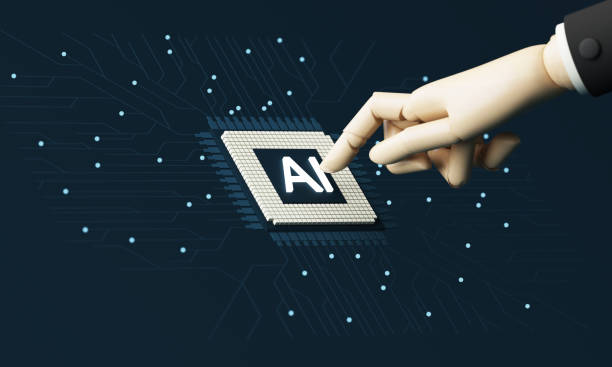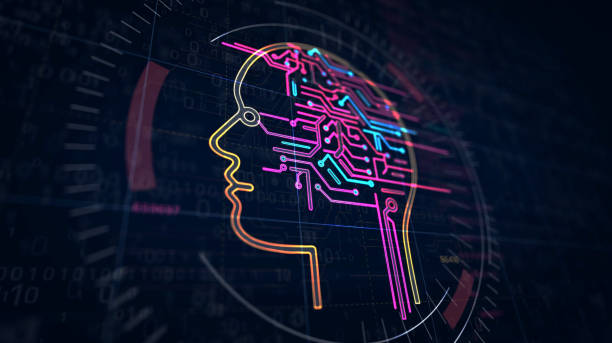What is Artificial Intelligence and How Does It Work?

Artificial Intelligence (AI) is a branch of computer science that seeks to create systems capable of performing tasks that typically require human intelligence.
These tasks include learning, reasoning, problem-solving, language comprehension, and pattern recognition.
Artificial intelligence has increasingly permeated our daily lives, from virtual assistants like Siri and Alexa to recommender systems on Netflix and Amazon.
At its core, AI uses algorithms and mathematical models to analyze data and make decisions.
These algorithms are often trained using large amounts of data, a process known as machine learning.
By being exposed to more data, AI systems can improve their performance and make more accurate decisions.
In summary, artificial intelligence enables systems to perform tasks that require human intelligence, including learning, reasoning, and problem-solving.
This field is rapidly advancing and has a profound impact on various industries and aspects of our lives.
A simple example of how AI works is in image recognition.
An AI system can be trained using millions of images of cats.
This system learns the patterns and features that define cats, such as the shape of their ears, eyes, and muzzle.
After training, the system can accurately identify new images and determine whether a cat is present in the image.
Research shows that 80% of customers trust companies with professional websites more. Does your current website build this trust?
With RasaWeb’s corporate website design services, permanently solve the problem of customer mistrust and a weak online image!
✅ Create a professional image and increase customer trust
✅ Attract more sales leads and grow your business
⚡ Get free consultation
Types of Artificial Intelligence – From Narrow AI to General AI

Artificial intelligence is generally divided into two main categories: Narrow AI and General AI.
Narrow AI, also known as weak AI, is designed to perform specific tasks.
This type of AI performs very well in a particular domain but cannot perform tasks outside that domain.
Examples of narrow AI include virtual assistants, recommender systems, and facial recognition software.
Narrow AI is currently the most common type of artificial intelligence and has widespread applications across various industries.
General AI, also known as strong AI, is a type of artificial intelligence that can learn and perform any task that a human can.
General AI is still in its early stages of development, and no complete general AI system currently exists.
Creating general AI is a significant challenge requiring considerable advancements in various fields of computer science.
However, general AI has the potential to bring about profound transformations in society and the economy.
In addition to these two main categories, there is another category called Super AI.
Super AI is a type of artificial intelligence that surpasses human intelligence and can perform tasks that humans are incapable of.
Super AI is a theoretical concept, and no super AI system currently exists.
However, there are many discussions about the potential risks and benefits of super AI.
Machine Learning – The Beating Heart of AI

Machine learning is a subset of artificial intelligence that enables systems to learn from data without explicit programming.
In machine learning, algorithms are trained using large amounts of data, learning patterns and relationships within the data.
After training, these algorithms can use this knowledge to make predictions, decisions, and perform other tasks.
Machine learning is a powerful tool with widespread applications in various fields, including image recognition, natural language processing, and fraud detection.
There are different types of machine learning algorithms, including supervised learning, unsupervised learning, and reinforcement learning.
In supervised learning, the algorithm is trained using labeled data, meaning the data has correct answers.
In unsupervised learning, the algorithm is trained using unlabeled data and must independently discover patterns and structures.
In reinforcement learning, the algorithm learns by interacting with an environment, receiving rewards for correct actions and penalties for incorrect ones, to learn how to make the best decisions.
Deep learning is an advanced branch of machine learning that uses artificial neural networks with multiple layers to learn from data.
Deep neural networks can learn more complex patterns in data and perform exceptionally well in tasks such as image recognition and natural language processing.
Due to its ability to solve complex problems, deep learning is rapidly becoming a significant area in artificial intelligence.
| Type of Machine Learning | Description | Applications |
|---|---|---|
| Supervised Learning | Training with labeled data | Image recognition, price prediction |
| Unsupervised Learning | Training with unlabeled data | Clustering, dimensionality reduction |
| Reinforcement Learning | Learning through interaction with the environment | Gaming, robotics |
Applications of Artificial Intelligence in Various Industries

Artificial intelligence is transforming various industries, and its applications are expanding daily.
In the medical industry, AI is used for disease diagnosis, drug development, and personalized treatment.
In the financial industry, AI is used for fraud detection, risk management, and customer service.
In the transportation industry, AI is used for developing self-driving cars, optimizing routes, and improving safety.
These are just a few examples of AI applications in different industries.
In the retail industry, artificial intelligence is used to personalize the shopping experience, predict demand, and improve supply chain management.
Recommender systems used in online stores are an example of AI application in this industry.
These systems analyze data related to previous customer purchases and suggest products that are likely to be of interest to them.
In the education industry, artificial intelligence is used to personalize learning, provide feedback to students, and automate administrative tasks.
AI-powered educational systems can help students learn at their own pace and receive support in areas where they need more help.
Overall, artificial intelligence has the potential to bring about profound transformations in the education industry.
Furthermore, artificial intelligence plays an important role in cybersecurity.
AI-based systems can automatically detect and respond to cyber threats, which helps organizations protect themselves against cyberattacks.
By analyzing network traffic patterns and identifying suspicious activities, these systems can detect threats before they harm the organization.
Are you concerned about your e-commerce website’s low conversion rate and not achieving your desired sales?
RasaWeb is your specialized solution for a successful e-commerce website.
✅ Significant increase in conversion rate and sales
✅ Professional and user-friendly design to attract customer satisfaction
⚡ Ready for a transformation in online sales? Get a free consultation!
Challenges and Limitations of Artificial Intelligence

Despite significant advancements, artificial intelligence still faces numerous challenges and limitations.
One of the biggest challenges is the need for large amounts of data to train AI models.
Collecting and labeling this data can be time-consuming and costly.
Furthermore, AI models are often dependent on their training data and may not react well to new and unexpected data.
Another challenge is the issue of interpretability.
Many AI models, especially deep neural networks, act like black boxes.
This means it’s difficult to understand how a model arrived at a particular result.
This issue can reduce trust in AI models and limit their use in sensitive areas such as medicine and law.
Also, there are concerns about the impact of artificial intelligence on the job market.
With the automation of many tasks, there is a possibility of job displacement for humans.
However, some experts believe that AI will also create new jobs and help humans perform their tasks more efficiently.
In any case, we must be prepared for potential changes in the job market.
Finally, ethical issues related to artificial intelligence must also be considered.
The use of AI in areas such as surveillance and facial recognition can lead to privacy violations.
Furthermore, it must be ensured that AI systems are fair and equitable and do not discriminate.
The Future of Artificial Intelligence – Prospects and Possibilities

The future of artificial intelligence is very bright and full of possibilities.
With continuous advancements in machine learning, natural language processing, and robotics, AI is expected to play an even more significant role in our lives in the coming years.
Self-driving cars, smarter virtual assistants, and more accurate medical systems are just a few examples of the potentials of artificial intelligence in the future.
In the healthcare sector, artificial intelligence can assist doctors in diagnosing diseases with higher accuracy and providing personalized treatments.
AI systems can analyze medical images, identify disease patterns, and aid doctors in treatment decisions.
Furthermore, AI can play a crucial role in the development of new drugs and vaccines.
In the manufacturing sector, artificial intelligence can help automate processes, improve product quality, and reduce costs.
Intelligent robots can perform repetitive and dangerous tasks, allowing humans to focus on more complex and creative tasks.
Additionally, AI can play an important role in optimizing supply chains and inventory management.
However, it must be noted that the development of artificial intelligence should be accompanied by responsibility and attention to ethical issues.
It must be ensured that AI systems are fair and equitable and respect individuals’ rights and privacy.
Artificial Intelligence and Robotics – Synergy of Power

Artificial intelligence and robotics are two related fields that, together, can create powerful systems.
Robotics deals with the design, construction, operation, and application of robots.
By integrating AI into robots, these systems can perform more complex tasks and make decisions autonomously.
Intelligent robots can be employed in various environments, from factories to hospitals and even space.
In the manufacturing industry, intelligent robots can perform tasks such as welding, painting, and packaging with high precision and speed.
These robots can automatically react to environmental changes and optimize their performance.
Additionally, intelligent robots can play a crucial role in product quality inspection and automatically identify defects.
In the service sector, intelligent robots can provide services to customers in hotels, restaurants, and stores.
These robots can answer customer questions, take orders, and deliver products.
Furthermore, intelligent robots can play an important role in caring for the elderly and disabled individuals.
| Application of Robotics and AI | Description | Advantages |
|---|---|---|
| Automated Production | Using robots to perform manufacturing tasks | Increased speed, accuracy, and reduced costs |
| Customer Service | Using robots to provide customer services | Improved customer experience and reduced waiting times |
| Healthcare | Using robots to assist patients and doctors | Improved quality of care and reduced medical errors |
Natural Language Processing – Understanding and Generating Human Language
![]()
Natural Language Processing (NLP) is a branch of artificial intelligence that deals with the interaction between computers and human language.
The goal of NLP is to enable computers to understand, interpret, generate, and respond to human language.
NLP has widespread applications in various fields, including machine translation, sentiment analysis, text summarization, and chatbots.
Natural language processing allows computers to communicate with humans in their own language and extract information from text and speech.
Machine translation is one of the important applications of NLP, enabling computers to translate text from one language to another.
Advanced machine translation systems can translate text with high accuracy, making it easy for readers to understand.
These systems are used in international trade, education, and tourism.
Sentiment analysis is another application of NLP, allowing computers to identify emotions present in text.
Sentiment analysis systems can identify positive, negative, and neutral emotions in text, helping organizations understand customer feedback on their products and services.
These systems are used in marketing, customer relationship management, and surveys.
Chatbots are NLP systems that can converse with humans online.
Chatbots can answer customer questions, provide information, and perform simple tasks.
These systems are used in customer service, sales, and technical support.
Are you dissatisfied with the low conversion rate of visitors to customers on your e-commerce site?
Solve this problem permanently with professional e-commerce website design by RasaWeb!
✅ Increase visitor-to-customer conversion rate
✅ Create an excellent user experience and build customer trust
⚡ Get a free consultation
Artificial Intelligence and Art – Creating Artworks with Algorithms

Artificial intelligence is entering the world of art, with artists and developers using AI algorithms to create new artworks.
AI systems can generate paintings, music, poetry, and stories that are aesthetically appealing and creative.
Artificial intelligence can serve as a powerful tool for artists, assisting them in creating new art pieces.
AI systems can learn various artistic styles using machine learning techniques and produce works in those styles.
These systems can analyze the artworks of famous artists and learn the key characteristics of their style.
Subsequently, these systems can generate works that resemble those of renowned artists.
Artificial intelligence can also be used to produce abstract and unconventional artworks.
AI systems can generate visually appealing and stimulating works using random and complex algorithms.
These artworks can help viewers see the world from new perspectives and gain new experiences.
However, some people believe that artworks generated by artificial intelligence lack emotion and originality.
They argue that art should be created by humans, and AI cannot replace human creativity and emotion.
Nonetheless, many others believe that artificial intelligence can be a valuable tool for artists, helping them create new and innovative artworks.
How to Learn Artificial Intelligence?

Learning artificial intelligence can be an exciting and challenging journey.
To start, you can familiarize yourself with basic computer science and mathematics concepts such as linear algebra, calculus, and statistics.
These concepts will help you better understand AI algorithms and models.
Learning artificial intelligence requires patience, perseverance, and continuous effort.
After familiarizing yourself with basic concepts, you can proceed to learn programming languages like Python and R.
These languages are widely used in AI development and provide powerful tools for implementing AI algorithms and models.
Additionally, you can become familiar with popular AI libraries and frameworks such as TensorFlow, Keras, and PyTorch.
These tools will help you quickly and easily create and train AI models.
In addition to theoretical learning, it is important to undertake practical AI projects.
By working on projects, you can better understand concepts and develop your practical skills.
You can undertake simple projects such as image recognition, text classification, and price prediction.
As you progress, you can tackle more complex projects and new challenges.
There are many online and offline learning resources available for artificial intelligence.
You can use online courses, books, articles, and videos.
Additionally, you can participate in AI conferences and workshops to connect with experts in the field and learn from their experiences.
In summary, learning artificial intelligence is a continuous process that requires effort, perseverance, and passion.
By learning fundamental concepts, programming languages, tools, and undertaking projects, you can acquire the necessary skills to become an AI specialist.
Frequently Asked Questions
| Question | Answer |
|---|---|
| What is Artificial Intelligence? | It is the simulation of human intelligence in machines programmed to think like humans and imitate their actions. |
| What are the main branches of Artificial Intelligence? | They include Machine Learning, Deep Learning, Natural Language Processing, Computer Vision, and Robotics. |
| What is Machine Learning? | It is a branch of AI that focuses on enabling systems to learn from data and identify patterns without explicit programming. |
| Mention examples of AI applications in our daily lives. | Voice assistants (like Siri and Alexa), recommender systems on Netflix and Amazon, self-driving cars, and facial recognition software. |
| What is Deep Learning? | It is a subset of Machine Learning that uses multi-layered (deep) artificial neural networks to process large amounts of data. |
| What is Natural Language Processing (NLP)? | It is a branch of AI that focuses on enabling computers to understand, interpret, and generate human language. |
| What are some ethical concerns related to Artificial Intelligence? | They include data bias, privacy, job displacement, and accountability in case of errors. |
| What are the main benefits of Artificial Intelligence? | Increased efficiency, improved decision-making, automation of repetitive tasks, and discovery of complex patterns in data. |
| How is Artificial Intelligence used in healthcare? | In disease diagnosis, drug discovery, medical image analysis, and personalized patient care. |
| How do you see the future of Artificial Intelligence? | It is expected to continue evolving rapidly, impacting all aspects of human life, from industry to education and entertainment. |
And other advertising agency services by RasaWeb in the field of advertising
- Smart Direct Marketing: Revolutionize campaign management with the help of attractive UI design.
- Smart Conversion Rate Optimization: A creative platform for improving click-through rate increase with SEO-driven content strategy.
- Smart Marketplace: A creative platform for improving click-through rate increase with marketing automation.
- Smart Data Analysis: Transform SEO ranking improvement with the help of marketing automation.
- Smart Custom Software: A combination of creativity and technology for analyzing customer behavior through user experience customization.
And over hundreds of other services in the field of internet advertising, advertising consulting, and organizational solutions
Internet Advertising | Advertising Strategy | Advertorial
Resources
The Impact of Artificial Intelligence on Daily Life
New Developments in Artificial Intelligence Technology
What is Artificial Intelligence and How Does It Work?
The Future of Artificial Intelligence in Iran
✅ RasaWeb Afarin Digital Marketing Agency, your strategic partner on the path to online brilliance! With services like professional SEO, social media management, and multilingual website design, we ensure a powerful and impactful online presence for your business. Contact us today and build the digital future of your business.
📍 Tehran, Mirdamad Street, next to Bank Markazi, Southern Kazeroun Alley, Ramin Alley, No. 6


